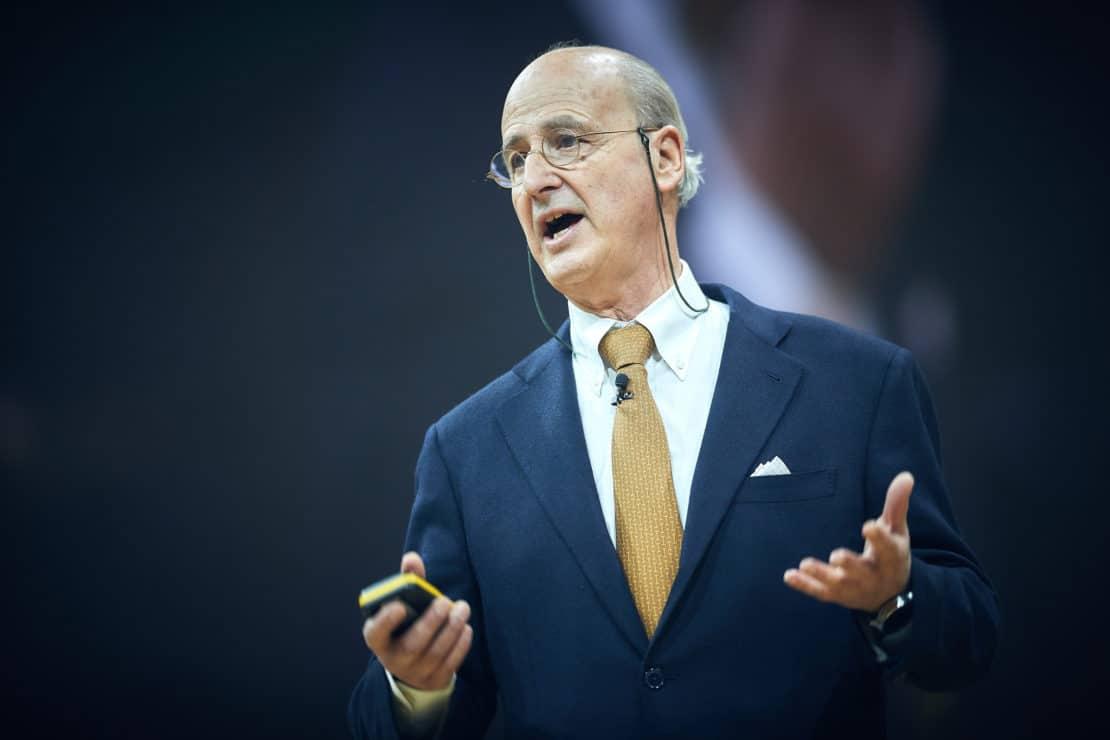23Apr2020
Yesterday we hosted a free webinar with Stéphane Garelli, the Emeritus Professor of World Competitiveness (University of Lausanne) and author of Top Class Competitors, to discuss new business models that will emerge from the COVID-19 crisis and what the effects are for the world economy and businesses. Garelli also shared advice and tips for business leaders to cope with the current situation. Here’s our summary of the key takeaways and if you missed the webinar you can also watch the recording. You can sign up for upcoming webinars here.
1. Watch out for the U-shaped recession
When it comes to the long term consequences of the crisis, Garelli estimates that the economy will go down sharply, but the recovery may take time. He explains that the recession would take a U-shaped model in which the economy will stay at the bottom for some time.
According to the past, it takes about 18 months to recover from the recession. However, the depth of the recession depends greatly on whether people spend or save money. Garelli thinks that most likely people start spending first during the first months after the lockdown, but after that, they continue saving. A huge factor is the fear of the second wave, which may make people careful of their spending. Once the spending slows down, recovery from the recession slows down as well.
2. Expect new local players and increase in prices
According to Garelli, the world of tomorrow will be a world where the economies are going to be much more decoupled from each other. This means the countries will probably want to have local supplies to avoid vulnerability. There will be more local players and national champions most likely in the food, health, and energy sectors. However, Garelli reminds us that whenever we have local supplies, it means that the prices are going to go up. Combining this together with the fact that many banks are printing a lot of money, he is certain that some inflation will happen.
3. See new business models and opportunities arise from new infrastructures
When it comes to the new business models, Garelli sees we are going to have new infrastructures coming to the market and new business models emerging from those. Ecommerce will become one of the main infrastructures of the new global economy. In addition, there are all sorts of other types of infrastructures being developed like electronic payments, e-medicine, e-learning, teleworking, and e-banking.
Garelli also predicts that we will be seeing more and more businesses turning to a model where you buy to use the product rather than buy to own it. He also sees three key fields where new business opportunities will most likely arise: 1) teleworking, 2) health and medicine, and 3) the biological sector.
4. Continue planning
Garelli’s advice to all companies and leaders is that you should continue planning. Plan how you will get out of this crisis, plan what will happen when everybody gets back in business, plan what you will intend to do even next year. Planning is good for the whole team because it tells there is life after all of this and that you and your team are ready when the crisis is over.
5. Understand where your competition is coming from
It may well be now more crucial than ever to be on the lookout for new competitors to stay ahead of the curve. The current crisis is speeding up innovation and forcing people to be creative. That’s why Garelli advises business leaders to have a wide vision of where the competition could come from, as it is highly probable that they come from unexpected places.
6. Test your ideas with your peers
Let’s face it – CEOs are fairly alone in the companies. The ugly truth is that your team might not be totally honest with you, but rather wants to please you. So for you to be able to really test your ideas, Garelli suggests that you should talk more to your peers. Go to events, book meetings with your peers, no matter if they work in different industries. One of the biggest advantages for a CEO is to have peers you can talk to about anything.
7. Mind the gap between generations
There’s a lot of talk about the generational gaps between millennials and the older generations. Garelli’s advice is to keep track of what the new generations are thinking. The millennials are your clients and they are also your employees. The younger generation has a different kind of outlook on things, so do not focus on the generation gap, but the mindset gap. Find a way to learn from the younger generations. For example, you could bridge the gap in your company by doing reverse mentoring, where the younger ones mentor the senior employees.

 by:
by: 
